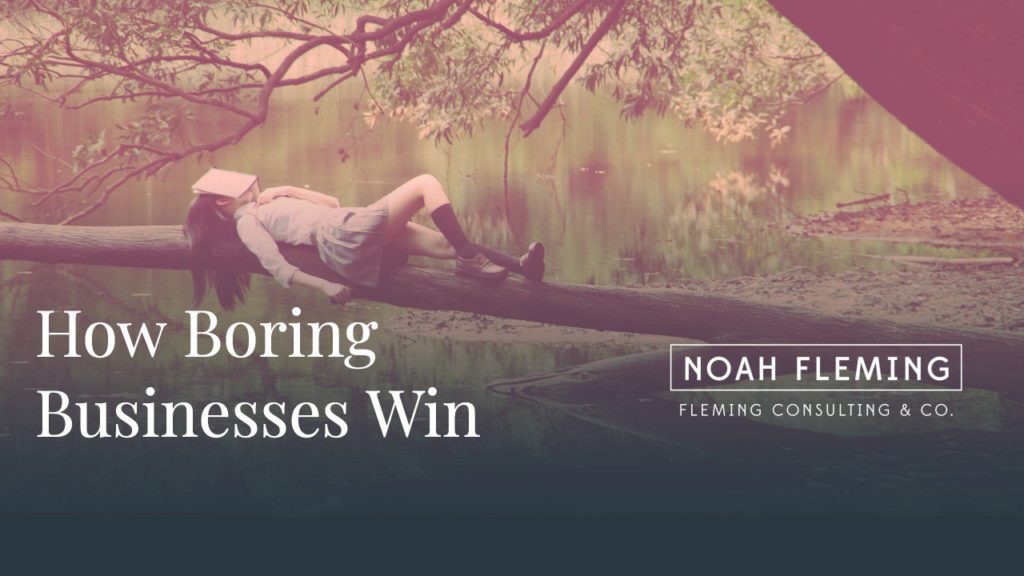I was speaking at an event not too long ago, and when I got onto the stage I introduced myself and let the crowd know that unlike the speakers before me, I’d be talking about a lot of very boring things.
As I said it, I realized that it was a little over 10 years ago that I said that for the first time on a stage.
Unfortunately, the need for me to be a boring Canadian guy is still relevant, because most companies really want to put their time and energy into sexy, exciting avenues.
Way back when it used to be things like enhancing their websites for maximum new client acquisition, or how to do themed customer appreciation events to really “wow” your clients
Now, there’s a lot more talk about how to integrate Artificial Intelligence throughout the organization – whole conferences are given on using AI to predict employee & customer attrition rates.
That’s sexy and exciting. It’s also pretty much useless for almost every company that I talk to.
Both 10 years ago, and today, there’s nothing fancy about what I share with business leaders.
Instead of talking about how you can use an AI based cryptocurrency to automatically connect with the Social Web, I talk about how to actually have a conversation with your customers.
And about how to ensure you’re not making it hard to do business with you.
And about how to motivate, manage, and improve your sales teams effectiveness.
In short – how to do business well.
Over the past ten years I’ve focused heavily on the simple and pushed back when my clients wanted complex.
“You want a fancy dashboard with 16 visual reports that you can quickly glance at every morning? That sounds great, but tell me how you’ll use the 16 reports. Actually, tell me how you'll use one or two of them.”
Most can’t.
Over the past 10 years, there’s been one lesson that’s proven true over and over again: The companies most unwilling to spend time on the basics are the ones that need them the most.
Early on in my career, I focused on the most boring topic of all – nurturing your existing clients over getting new ones. This was the cornerstone of my first book, Evergreen, and my clients have done very well by turning their focus inwards to dramatically reduce attrition rates, improve lifetime value of their clients, and as a side benefit, have better reputations & higher referral rates.
Since then, I’ve identified 10 other areas that are similarly important, and similarly overlooked by most companies for being too basic.
Diligent readers will recognize many of these… Among them are processes, internal benchmarking, coaching, and exception reporting.
All of the 10 new areas are worth an investment of time, attention, and money.
As a very short example:
I’ve focused a lot in the last year specifically around helping companies build the right processes and ensuring people are doing what you expect them to be doing.
Around helping senior executives recognize the things they should be measuring and the things they can safely ignore.
This work has had such a demonstrable impact for my clients it's hard to quantify.
It’s allowed us to build a sales process that sales teams use in a single day, instead of laboring over this for six months only to have a general salesperson revolt.
It’s allowed us to trim the fat and build a meaningful corporate strategy in a day, rather than a binder full of fluff that accumulates over a year.
It’s allowed us to make ongoing client engagement a primary driver of new revenue, and given senior executives confidence that those efforts are actually taking place.
Here’s something to consider:
If you’ve read more than 5 of my Tidbits, you know that these areas are important.
If you haven’t put them into place in a way that you’re 100% confident is working yet, then chances are you’re not going to be able to do it on your own now all of a sudden.
After all, if you could have done it already, it would be done.
If it’s not, then let me help.
I now work with my best clients in two ways.
- Through an advisory relationship where I become part of your team to help you create the most meaningful changes immediately and ongoing.
- The 1-Day Sales Process which is applicable for more than just sales.
It’s now February and the days are flying by. If we haven’t had a discussion, now’s the time. Reach out or hit reply to this email and let's set up a time to talk.
Your Challenge For This Week:
Get more boring.
Spend 15-30 minutes with me over the next two weeks to see what boring things you’re missing at the expense of things that may be sexy but lacking substance.
Cheers
Noah
